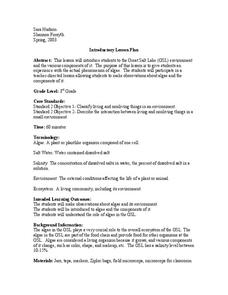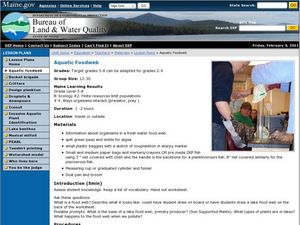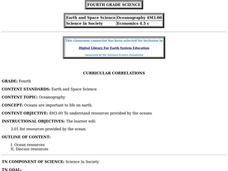Curated OER
What Foods Contain Products from the Ocean
Fifth graders learn about foods from the ocean. In this ocean products instructional activity, 5th graders brainstorm what foods come from the ocean, fill in a Venn Diagram comparing alginates, carrageenans and beta carotenes. Students...
Curated OER
Theater Game: "The Good, the Bad, and the Bountiful"
Students play a game to demonstrate the detrimental effects of an algal bloom on the environment. In this microorganism lesson, students discuss microbes and algae. They dramatize the effects of an algal bloom using a role-playing game.
Curated OER
Phytoplankton and Ocean Color
Fifth graders identify function of phytoplankton in the biospere by conducting experiments and simulations and reading for information. They detect the presence of phytoplankton in bodies of water by examining ocean in satellite images...
Curated OER
Eutrophication
Students observe the effects of eutrophication and determine why it is harmful to aquatic ecosystems. They create mason jar ecosystems to observe the growth of algae in pond water. In addition, they observe the effect of introducing...
Curated OER
Grow it Now, Drive it Later?
What do corn and career exploration have in common? A lot, if you're considering an agricultural career that contributes to alternative fuel resources. Through a series of films, presentations, activities, and readings, learners will...
Curated OER
WET Science Lesson #5: Pass the Salt Please! (How Road Salt Affects Wetlands)
As an anticipatory set, biologists listen to the story of Ruth Patrick, a scientist who used algae to detect water quality. They observe a demonstration of osmosis and diffusion. In their lab groups, they place Elodea stalks in...
Curated OER
Great Salt Lake
Third graders are introduced to the Great Salt Lake (GSL) environment and the various components of it. They make observations about algae and its environment and discuss why it is considered a living organism and various components of...
Curated OER
Let it Grow and See What Happens
Pupils participate in an experiment in which they try to stop algae from growing. In groups, they develop a hypothesis and test it while making changes to the experiment along the way. They make observations and organize their data to...
Curated OER
Bad Algae!
Learners explore algal blooms. In this ecosystem and health lesson, students define and describe harmful algal blooms, then discuss ways in which the impact of these algal blooms could be reduced. Learners work in groups to research...
Curated OER
Algae in the Aquarium
Tenth graders determine the cause of an algal bloom in a classroom aquarium. Students analyze the situation and present a solution to the problem in the given time frame after researching and conducting experiments. Solutions are...
Curated OER
TE Lesson: How Clean is that Water?
Middle schoolers examine the factors the affect water quality, and allow for animals and plants to live. They look at how engineers apply water quality information when making stream modifications in order to ensure drinking water...
Curated OER
There Are Algae in Your House!
Students demonstrate that, although we sometimes can neither smell nor taste them, many ingredients in our foods and household products come from the sea. They also investigate food eat to determine algae derivatives they contain.
Curated OER
Effects of Nitrate and Phosphate Changes on the Growth of Algae
Students determine the effects of an increase of the amount of nitrate and phosphate levels on the growth of algae. the development of a hypothesis is encouraged and students proceed to a conclusion based on their results.
Curated OER
Prokaryotes and Eukaryotes
Examine cyanobacteria cells as an example of prokaryotes and several other alga as examples of eukaryotes. Future biologists compare the two and notice the absence of nuclei in prokaryotes. These are classic activities for this purpose,...
Curated OER
$$$eaweed
Young scholars compare and evaluate the world's different seaweeds. For this investigative lesson students study seaweed and the harvesting of it. They then interpret the data collected and graph the seaweed production.
Curated OER
Aquatic Foodweb
Learners explore what a food web is. In this science instructional activity, students examine how nutrients and other pollutants enter a lake and play a food web game whereby learners pretend they are either zooplankton, planktivore,...
Curated OER
Limu Party
Students explore limu in their everyday lives. In this science lesson, students identify various uses of limu and discuss common household products that contain limu. Students participate in a limu party.
Curated OER
Oceanography
Fourth graders explore the importance of oceans in supporting life on earth and identify resources obtained from the ocean.
Curated OER
Exploring Limu Diversity
Students explore limu diversity. In this ocean ecosystem lesson, students classify limu according to its physical properties. Students work in small groups to generate scientific observations and sort limu by characteristics.
Curated OER
Diversity of Life
Students identify the difference between eukaryote and prokaryotes and examine the structure of bacteria. In this bacteria lesson students examine the different ways that bacteria are classified through an activity.
Curated OER
Ocean Market
Students identify some consumer goods that come from the ocean.
They classify these items into groups, identify their source, and calculate the cost of buying such goods.
Curated OER
Is Your Water Clean?
Students compare water quality of different sources. They test water samples for odor, phosphates, pH, bacteria, and dissolved solids. they fill out a data table and answer questions about their findings.
Curated OER
Oceanography: Understanding the Relationship Among Ocean Food Chains
Fourth graders explore relationships among organisms involved in ocean food chains to investigate interdependence of the organisms.
Curated OER
Limu and ME!
Students explore limu. In this cross curiculum botany and art project, students view a limu-picking film and then collect several species of limu. Students follow a sequence of instructions using limu, card stock and wax paper to create...
Other popular searches
- Algae. Phytoplankton
- Algae Growth
- Coralline Algae
- Algae Cells
- Marine Algae
- Red Algae
- Corals and Algae
- Algae Blooms
- Multicellular Algae
- Blue Green Algae
- Phosphate Algae Detergents
- Green Algae

























